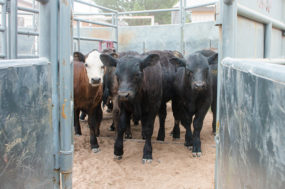In a difficult time for agriculture, when producers are already facing low commodity prices and trade uncertainty, many livestock producers may also have to be concerned about something else in the coming years: California voters.
In November 2018, California voters passed Proposition 12 with 59 percent of the vote. This ballot initiative prohibits California businesses from knowingly selling veal, pork, shell eggs or liquid eggs produced by animals “confined in a cruel manner.” The statute defines “confined in a cruel manner” to mean any of the following practices:
- Confining an animal in any manner that prevents the animal from lying down, standing up, fully extending the animal’s limbs or turning around freely
- After Dec. 31, 2019, confining a calf raised for veal with less than 43 square feet of usable floor space per calf
- After Dec. 31, 2019, confining an egg-laying hen with less than 144 square inches of usable floor space per hen
- After Dec. 31, 2021, confining a breeding pig with less than 24 square feet of usable space per pig
- After Dec. 31, 2021, confining an egg-laying hen in an enclosure other than a cage-free housing system.
Ironically enough, the measure was opposed by groups on both sides of the animal welfare issue, including the National Pork Producers Council (NPPC) and the People for the Ethical Treatment of Animals (PETA).
The NPPC opposed the proposition because it will increase production costs for farmers and prices for consumers. PETA opposed as well, arguing the initiative did not go far enough to prevent animal cruelty.
This was not the first ballot initiative of this type to come out of the Golden State. In 2015, California passed a law stating a shelled egg may not be sold or contracted for sale for human consumption in California if the egg is the product of a hen that was at a confined farm or a farm not in compliance with California animal care standards, which requires hens be allowed to lie down, stand up, fully exercise their limbs and turn around freely.
Numerous states, led by Missouri and Indiana, filed suit against this 2015 law in the U.S. Supreme Court but, in January 2019, the justices refused to hear the cases.
On its face, Proposition 12 applies only to California businesses selling pork, veal and eggs. However, in practice, it has the potential to impact farmers and ranchers producing beef, pork and eggs nationwide. If a farmer in Texas, for example, does not adopt these practices, then he or she will be unable to sell his or her products in California.
These types of ballot initiatives could certainly be expanded to additional products and could have major impacts on the farm level, requiring producers to invest in new or different facilities in order to continue producing their products. This is an issue of which everyone involved in production agriculture should be aware. ![]()

-
Tiffany Dowell Lashmet
- Assistant Professor and Extension Specialist – Agricultural Law
- Texas A&M AgriLife - Extension Service
- Email Tiffany Dowell Lashmet





